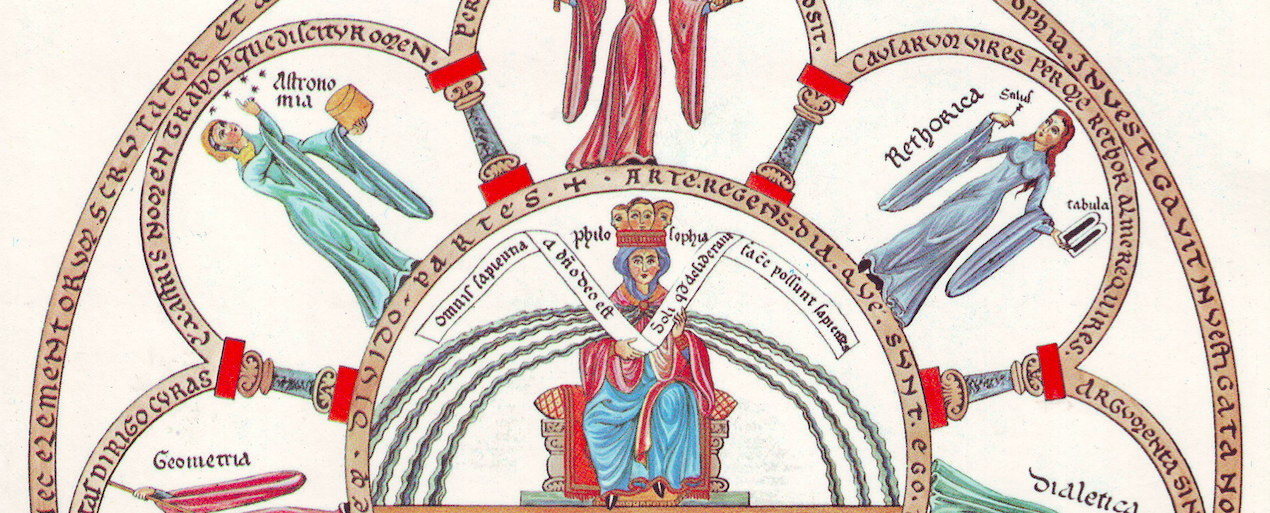Dissertations are read by comparatively few people, in the grand scheme of things—certainly by far fewer people than helped me towards the completion of mine. Doctoral research has deep roots; those of my own work stretch back not just through my years at the University of Iowa, but back to my time as a Master’s student in Scotland and my formative years in Ireland. The debt of gratitude I owe to so many makes me disinclined to keep the acknowledgements section between the covers of my dissertation, so I reproduce it here below.
Header image: Hortus Deliciarum, f.32
Research for this dissertation was supported in part by the Presidential Graduate Fellowship and by the Fellowship Incentive Program of the Graduate College at the University of Iowa, by a Stanley-UI Foundation Graduate Award for International Research, and by the William O. Aydelotte Dissertation Fellowship awarded by the University of Iowa’s Department of History. I am extremely grateful for the financial support which made this dissertation possible.
My dissertation advisor, Constance Hoffman Berman, has directed my work at Iowa since my earliest days in the program. Her forthright championing of scholarship by and about women has been inspirational to many, and I am so glad to be able to contribute to a tradition of amplifying women’s voices. I am grateful also to the other faculty members and staff of the University of Iowa—particularly Kathleen Kamerick, Jennifer Teitle, Raymond Mentzer, Keisha Blain, Sarah Bond, Michael E. Moore, and Katherine Tachau—for the advice, guidance, example, and encouragement which they have provided me over the years. Especial thanks must also be given to the administrative staff of the Department of History—Pat Goodwin, Sheri Sojka, Heather Roth, Jean Aikin, and Mary Strottman—whose good humor, efficiency, and photocopier skills were always invaluable. Amy Livingstone, my external committee member, was an invaluable source of good-humoured and no-nonsense critique.
There were also many people who helped to shape me as a researcher and a scholar before I came to the University of Iowa. Little did I suspect when Dolores Healy was drilling me in French grammar when I was a student at the Brigidine Convent Secondary School, Mountrath, just how valuable that careful training would one day be or how far it would take me. During my time as an undergraduate at Trinity College Dublin, Christine Meek taught me to look for the women in the sources, and Terry Barry showed me the importance of grounding history in the material world. As a Master’s student at the University of St Andrews, I gained my first experience in real historical research under the fastidious guidance of Frances Andrews.
I must also acknowledge the invaluable and helpful assistance of the staff of a number of institutions: the University of Iowa Library, particularly the InterLibrary Loan Department, who sourced many antiquarian articles of surpassing obscurity for me; the Bibliothèque nationale de France, Paris; the Archives départmentales de l’Aisne, Laon (particularly M. Jean-Christophe Dumain); the Archives nationales, Paris; the Médiathèque de l’Architecture et du Patrimoine, Paris; the library of the École nationale des chartes, Paris; the Institut de Recherche et d’Histoire des Textes, Paris; the Bibliothèque municipale, Soissons; the Société Archéologique et Historique de Soissons (particularly Mme. Monique Judas-Urschel); the Pôle archéologique du Conseil départemental de l’Aisne (particularly M. Thierry Galmiche); and the staff of the Mitchell Library, Glasgow (particularly Archie Fisher, Patricia Grant and Susan Taylor). Various aspects of this research were presented at annual conferences of the Midwest Medieval History Conference, the Haskins Society, the International Congress on Medieval Studies, and the Women and Gender Historians of the Midwest Society; at the Jakobsen Graduate Conference of the University of Iowa; and at the Forum of the Graduate History Society of the University of Iowa. I am grateful for the feedback and advice provided by the attendees of those meetings, which has proved instrumental in my work.
This dissertation would not have been possible without the numerous friends and family members who have provided unceasing emotional support, good cheer, and cups of tea over the years. I especially thank Catherine Denial (my big sister in every way that counts), Claire Conway (my partner-in-crime since childhood), and Anna Kaufman (my brain twin), for their level-headed advice and writing feedback. In Heather Wacha, I have had a knowledgeable, enthusiastic collaborator, trustworthy sounding board, and good friend—mille fois merci! I must also thank members of my graduate student writing group and pre-modernist cohort: Noaquia Callahan, Kristi DiClemente, Katherine Massoth, Marlino Mubai, Briana Smith, Rebecca Smith, Scott Sulzener, Gabe Baker, and Allison Wells. Finally, my deepest thanks to my parents, John and Pauline Seale, to my sister Lorraine, and to my wider family, particularly my beloved grandparents, aunts, and uncles. They have been extraordinarily patient about having a daughter living 6000 kilometers from home. I could not have achieved this without them.
